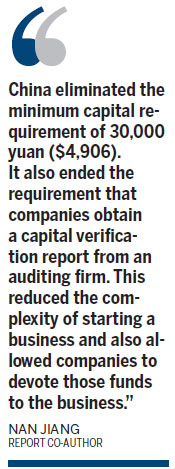Mainland in middle in report by World Bank
Updated: 2014-10-31 14:03
By Paul Welitzkin in New York(China Daily USA)
|
|||||||||
Inefficiencies in construction permit process hurt China rank
When combined with Hong Kong, the mainland's economy has one of the top five business-friendly regulatory environments among close to 200 of the world's economies, according to a World Bank Group report.
On its own, the Chinese mainland places in the middle of the report's global rankings due in part to inefficiencies in obtaining construction permits.
Mainland/Hong Kong SAR placed third in the overall rankings behind New Zealand at No two and first-place Singapore. The US placed seventh.
The annual World Bank Group report released on Wednesday analyzes regulations that apply to an economy's businesses in 10 categories including trading across borders, paying taxes, and resolving insolvency. This year's report analyzed 189 economies in the world.
The report -- Doing Business 2015: Going Beyond Efficiency -- found that governments around the world are improving the regulatory environment for small and medium-sized enterprises. Local entrepreneurs in the East Asia and Pacific region continue to see improvements in the business environment as the region's economies made 24 regulatory reforms in the past year, the report said.
The report was co-authored by Rita Ramalho and Charlotte Nan Jiang of the World Bank.
Nan Jiang said the mainland enhanced its electronic filing and payment systems to make paying taxes easier and less costly. It also made business incorporation less expensive.
"China eliminated the minimum capital requirement of 30,000 yuan ($4,906). It also ended the requirement that companies obtain a capital verification report from an auditing firm. This reduced the complexity of starting a business and also allowed companies to devote those funds to the business," she told China Daily.
She said one area that the mainland needs to improve is in obtaining construction permits.

"We found that in Shanghai it took a company on average of 274 days to build a warehouse and in Beijing it was 208 days," she said. "In the East Asia and Pacific region the average time to build a warehouse was 134 days."
She said the cost of completing that warehouse in the mainland represented about 7.6 percent of the building's value as opposed to 2.1 percent of building value in the East Asia and Pacific region. "Not only does it take longer to build the warehouse in the mainland, it also costs more," she added.
The report has a category on obtaining credit, which includes scoring the legal rights of borrowers and lenders and the availability and depth of credit information. On its own, the mainland's ranking was 71st in the world and 23rd with Hong Kong.
Nan Jiang noted that the mainland didn't even have a credit registry with basic information until eight years ago. The mainland's credit registry doesn't include information on potential borrowers from utilities and retailers that one can find in credit reports in the US and other advanced economies, she said.
Kevin Gallagher, co-director of the Global Economic Governance Initiative at the Frederick S. Pardee School of Global Studies at Boston University, said it's difficult for small and medium-sized businesses to get access to credit in the mainland.
The mainland remains an attractive place for many businesses, Gallagher said.
"As far as I can tell China is still the No 1 destination for companies outside of the West," he said. "You have to be careful with rankings like this because they tend to view any regulation or law as a hindrance to business and that is not always the case."
Judith Dean, a professor of international economics at the international business school at Brandeis University in Waltham, Massachusetts, said that over the past decade some business financing has become available, but there is still very little local financing available for the private sector.
"This is partly due to a legacy where the banking system geared finance largely toward state-owned enterprises," she told China Daily in an email. "While reform has taken place, there is still a long way to go."
The World Bank's Nan Jiang said Singapore's top ranking is due mainly to the country's consistency when it comes to regulations.
"Singapore scores well in all of the categories as its worst ranking is 24th (in registering property). This shows that a comprehensive approach to the regulatory environment probably works best," she said.
paulwelitzkin@chinadailyusa.com

 Art Taipei 2014 draws international artists
Art Taipei 2014 draws international artists
 Tibetan culture to display splendor in Canada
Tibetan culture to display splendor in Canada
 Reclaiming a piece of history
Reclaiming a piece of history
 Across Americas over the week (Oct 24-30)
Across Americas over the week (Oct 24-30)
 Halloween haunts China as popularity grows
Halloween haunts China as popularity grows
 At least 4 killed in small plane crash in Kansas
At least 4 killed in small plane crash in Kansas
 Road trip to Arxan National Forest Park
Road trip to Arxan National Forest Park
 Top 10 richest Chinese in 2014
Top 10 richest Chinese in 2014
Most Viewed
Editor's Picks

|

|

|

|

|

|
Today's Top News
Space tourism set back by accident
Chinese Internet companies find Brazil attractive
US spaceship test flight failure kills at least one
Breast cancer a factor in Shanghai's low birth rate: doctor
Lenovo buys Motorola Mobility
China rail reps visit California
China pledges financial aid to Afghanistan
Olympics bid fuels drive for clean air
US Weekly

|

|








